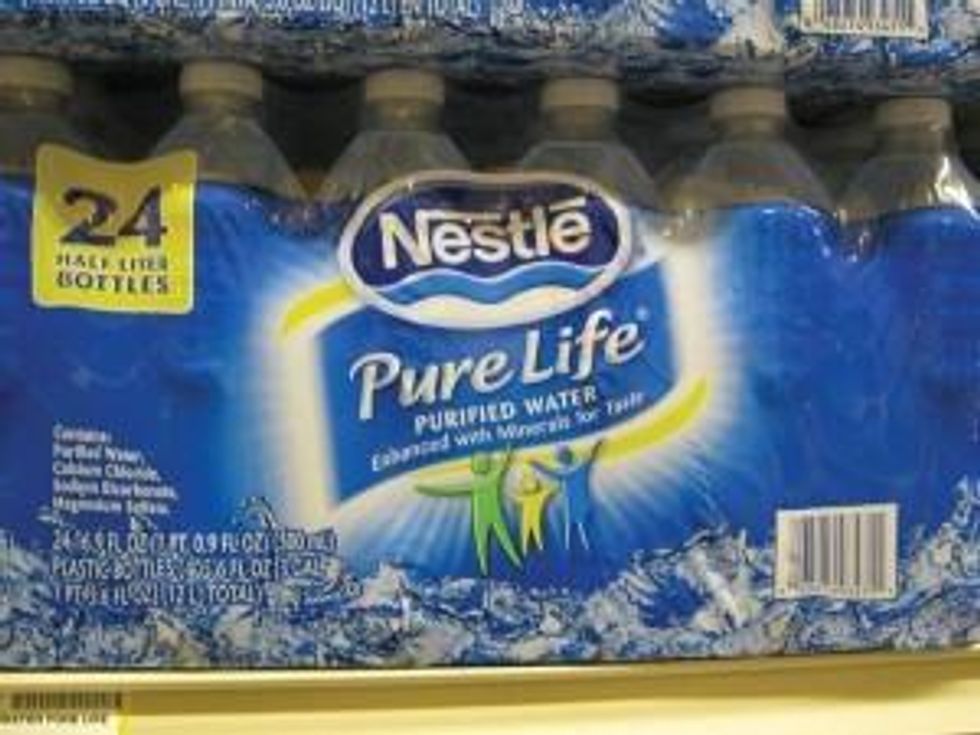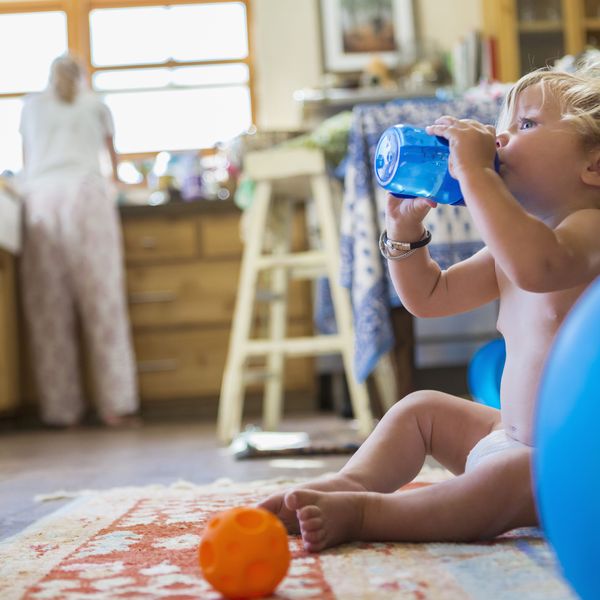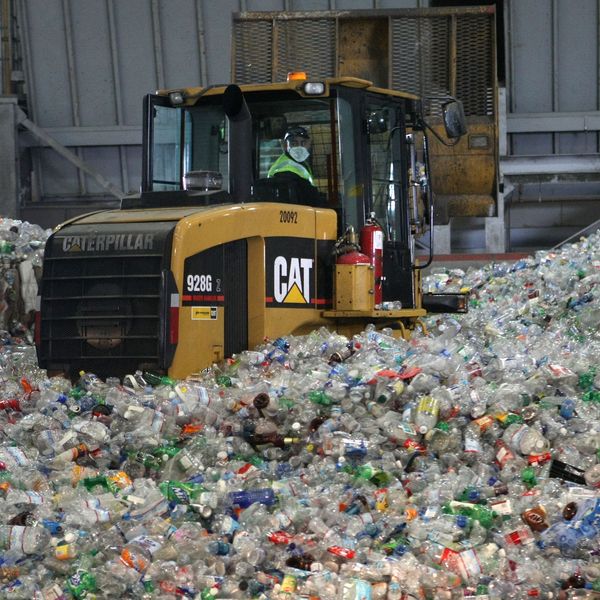Nestle Targets Developing Nations for Bottled Water, Infant Formula Sales
On Monday, Nestle announced it had purchased Pfizer's infant nutrition unit, which will strengthen their ability to sell infant formula in emerging markets, particularly in Asia.
On Monday, Nestle announced it had purchased Pfizer's infant nutrition unit, which will strengthen their ability to sell infant formula in emerging markets, particularly in Asia. The move is not surprising, since 85 percent of Pfizer's infant nutrition revenues came from developing countries, where Nestle is also looking to expand its sales of bottled water.

How do we know this? Nestle has declared both its Pure Life brand of bottled water and infant formula as "Popularly Positioned Products" (PPP) that target "less affluent consumers in emerging markets". Two weeks ago, we mentioned Nestle's report outlining this strategy in this blog. For some reason, the report is no longer available on Nestle's site without the requisite log-in information. But we've reposted the document here.
Our executive director, Wenonah Hauter, released this statement in response to Nestle's purchase of Pfizer's infant nutrition unit:
This renewed focus on growing the market for its infant formula products is troubling given the corporation's track record of using dubious practices to market infant formula in developing countries, where it is often prepared in unhygienic conditions with unsafe water....Surely, it is no coincidence that many mothers will prepare the formula with bottled water--which will no doubt benefit Nestle's emerging market strategy.
Selling bottled water to poor people, and pushing infant formula on poor but otherwise healthy mothers who may not have access to safe drinking water is doing what Nestle does best: undermining public health in the name of profit.
For more on Nestle's plan to market bottled water in developing nations to offset the drop-off in sales from developed countries, read our report, Hanging on for Pure Life.
An Urgent Message From Our Co-Founder
Dear Common Dreams reader, The U.S. is on a fast track to authoritarianism like nothing I've ever seen. Meanwhile, corporate news outlets are utterly capitulating to Trump, twisting their coverage to avoid drawing his ire while lining up to stuff cash in his pockets. That's why I believe that Common Dreams is doing the best and most consequential reporting that we've ever done. Our small but mighty team is a progressive reporting powerhouse, covering the news every day that the corporate media never will. Our mission has always been simple: To inform. To inspire. And to ignite change for the common good. Now here's the key piece that I want all our readers to understand: None of this would be possible without your financial support. That's not just some fundraising cliche. It's the absolute and literal truth. We don't accept corporate advertising and never will. We don't have a paywall because we don't think people should be blocked from critical news based on their ability to pay. Everything we do is funded by the donations of readers like you. Will you donate now to help power the nonprofit, independent reporting of Common Dreams? Thank you for being a vital member of our community. Together, we can keep independent journalism alive when it’s needed most. - Craig Brown, Co-founder |
On Monday, Nestle announced it had purchased Pfizer's infant nutrition unit, which will strengthen their ability to sell infant formula in emerging markets, particularly in Asia. The move is not surprising, since 85 percent of Pfizer's infant nutrition revenues came from developing countries, where Nestle is also looking to expand its sales of bottled water.

How do we know this? Nestle has declared both its Pure Life brand of bottled water and infant formula as "Popularly Positioned Products" (PPP) that target "less affluent consumers in emerging markets". Two weeks ago, we mentioned Nestle's report outlining this strategy in this blog. For some reason, the report is no longer available on Nestle's site without the requisite log-in information. But we've reposted the document here.
Our executive director, Wenonah Hauter, released this statement in response to Nestle's purchase of Pfizer's infant nutrition unit:
This renewed focus on growing the market for its infant formula products is troubling given the corporation's track record of using dubious practices to market infant formula in developing countries, where it is often prepared in unhygienic conditions with unsafe water....Surely, it is no coincidence that many mothers will prepare the formula with bottled water--which will no doubt benefit Nestle's emerging market strategy.
Selling bottled water to poor people, and pushing infant formula on poor but otherwise healthy mothers who may not have access to safe drinking water is doing what Nestle does best: undermining public health in the name of profit.
For more on Nestle's plan to market bottled water in developing nations to offset the drop-off in sales from developed countries, read our report, Hanging on for Pure Life.
On Monday, Nestle announced it had purchased Pfizer's infant nutrition unit, which will strengthen their ability to sell infant formula in emerging markets, particularly in Asia. The move is not surprising, since 85 percent of Pfizer's infant nutrition revenues came from developing countries, where Nestle is also looking to expand its sales of bottled water.

How do we know this? Nestle has declared both its Pure Life brand of bottled water and infant formula as "Popularly Positioned Products" (PPP) that target "less affluent consumers in emerging markets". Two weeks ago, we mentioned Nestle's report outlining this strategy in this blog. For some reason, the report is no longer available on Nestle's site without the requisite log-in information. But we've reposted the document here.
Our executive director, Wenonah Hauter, released this statement in response to Nestle's purchase of Pfizer's infant nutrition unit:
This renewed focus on growing the market for its infant formula products is troubling given the corporation's track record of using dubious practices to market infant formula in developing countries, where it is often prepared in unhygienic conditions with unsafe water....Surely, it is no coincidence that many mothers will prepare the formula with bottled water--which will no doubt benefit Nestle's emerging market strategy.
Selling bottled water to poor people, and pushing infant formula on poor but otherwise healthy mothers who may not have access to safe drinking water is doing what Nestle does best: undermining public health in the name of profit.
For more on Nestle's plan to market bottled water in developing nations to offset the drop-off in sales from developed countries, read our report, Hanging on for Pure Life.

